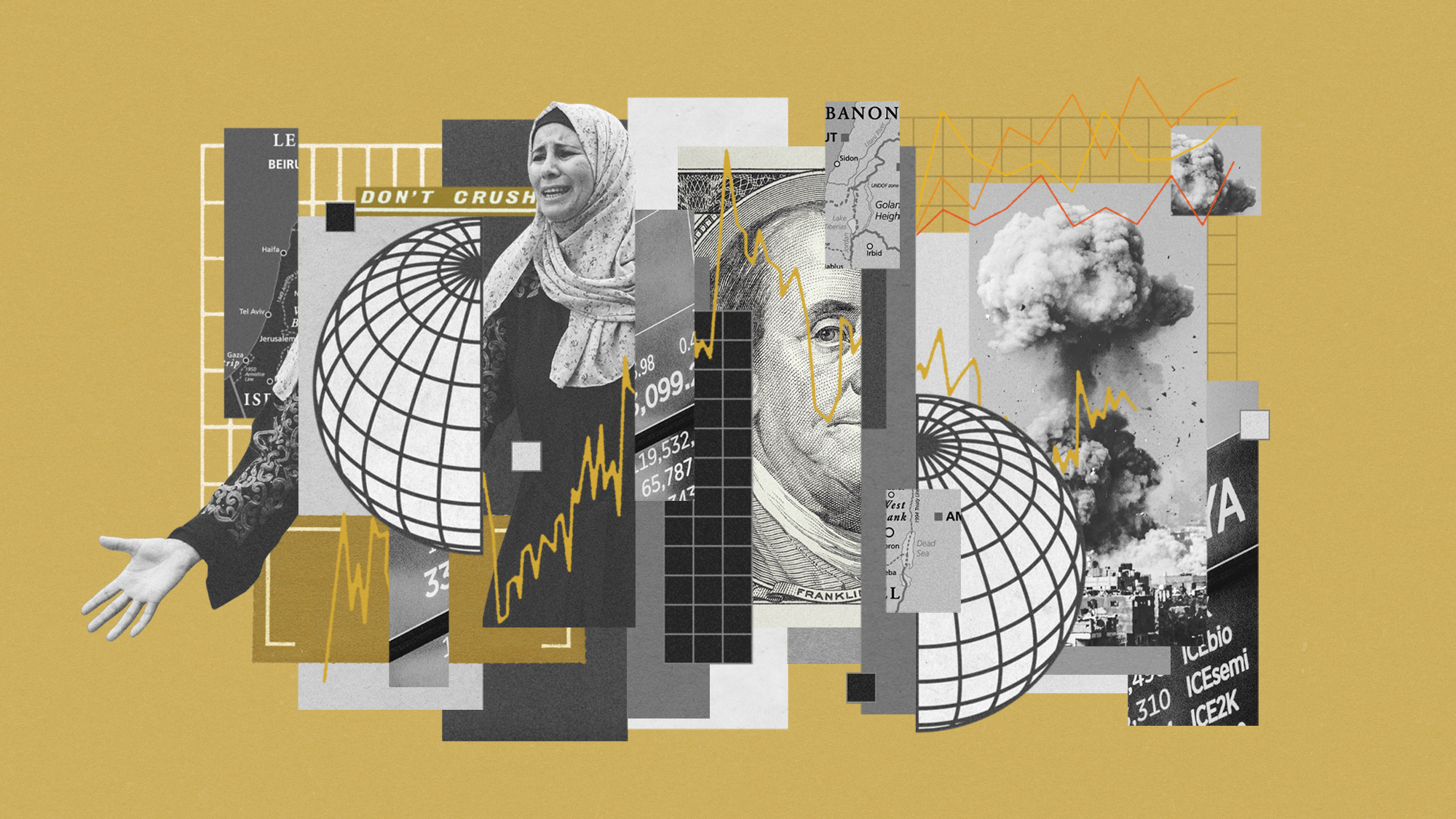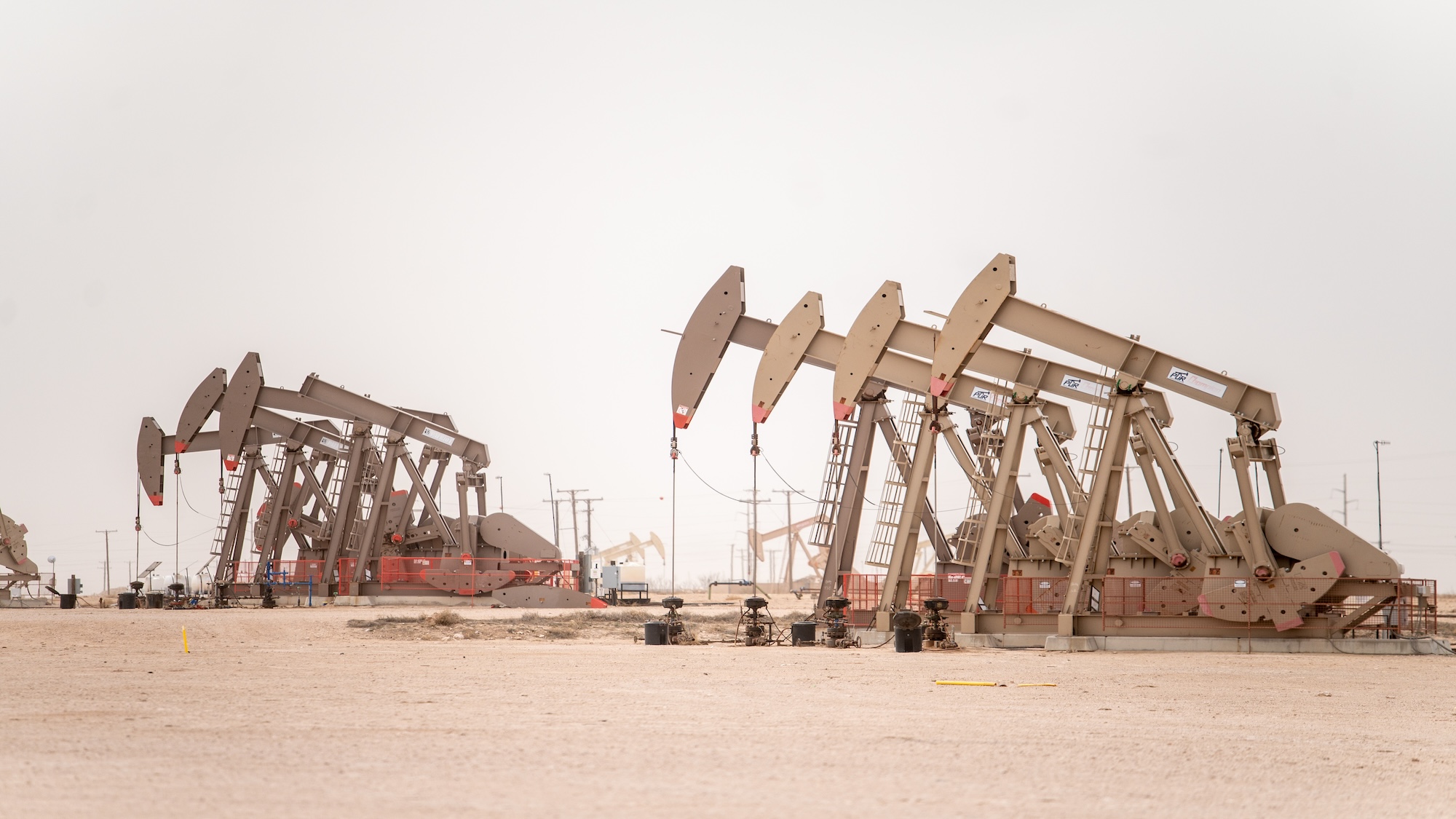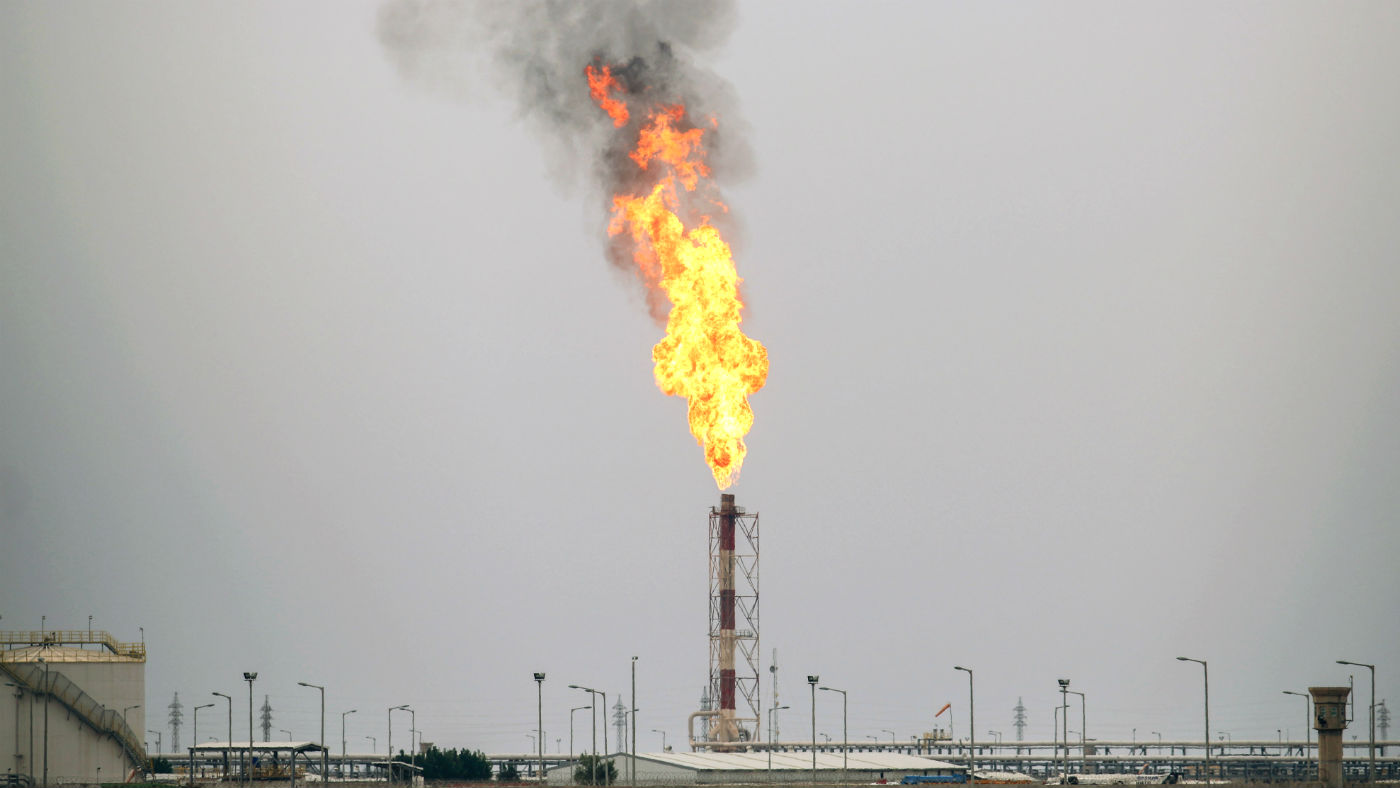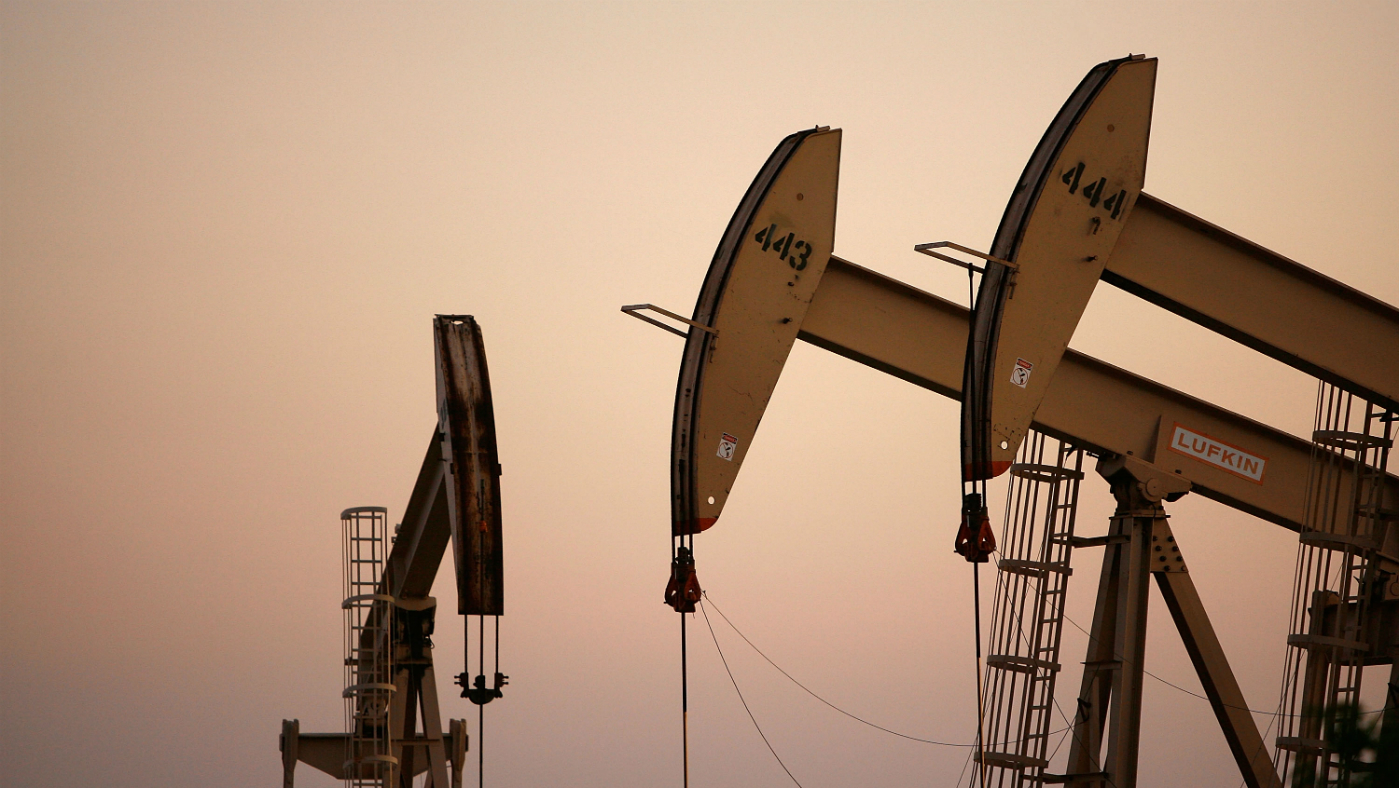Oil price posts two-year highs - but how long can it last?
Brent rose above $59 a barrel this week, its best third-quarter showing since 2004

A free daily email with the biggest news stories of the day – and the best features from TheWeek.com
You are now subscribed
Your newsletter sign-up was successful
Oil price: 'Traders should brace for Opec disappointment'
22 September
Oil rallied in the past two sessions after bullish data on US reserves and another vote to hold interest rates by the Federal Reserve.
International oil price benchmark Brent crude rose for the second consecutive session overnight and was 1.7 per cent up in London this afternoon to $47.62. US counterpart West Texas Intermediate was up two per cent to $46.26.
The Week
Escape your echo chamber. Get the facts behind the news, plus analysis from multiple perspectives.

Sign up for The Week's Free Newsletters
From our morning news briefing to a weekly Good News Newsletter, get the best of The Week delivered directly to your inbox.
From our morning news briefing to a weekly Good News Newsletter, get the best of The Week delivered directly to your inbox.
Sentiment was bolstered following a surprise 6.2 million barrel draw on US oil reserves last week, revealed by watchdog the Energy Information Administration. That's the second-largest reduction this year and, coming just two weeks after a huge 14.2 million barrel drop, adds to optimism that the market is closer to balance than it has been for two years.
Last night's decision by the Fed to hold rates also helped as it prompted a fall for the dollar, making oil cheaper for overseas buyers and so stokes demand.
All of which has "emboldened" investors ahead of a meeting of the Opec oil cartel next week, says Reuters. Several members, such as Venezuela, have talked up the chances of an output cap being agreed.
Analysts say oil could be set to enjoy "further strength" in New York this evening and through tomorrow.
A free daily email with the biggest news stories of the day – and the best features from TheWeek.com
But after that, the rally could run out of steam – as several upward moves have whenever the oil price has approached $50 in recent months.
That's because very few experts actually expect an output deal to be agreed, or believe a freeze to current high export levels would be sufficient to justify a more sustained price recovery.
Worse, says Nick Cunningham on Oilprice.com, the "disappointment" from the Opec meeting could undermine any and all oil price rallies for months ahead.
He points to increases to output still to come through, including from Libya, which this week sent the first oil cargo from the port of Ras Lanuf for more than two years.
Nigeria's production is also recovering after sabotage attacks disrupted a number of pipelines earlier this year, while non-Opec Russia was yesterday revealed to have pumped a record 11 million barrels last week.
"So, I mean, it's just a joke," said John Kilduff of Again Capital Partners. "I think we reach $40 on the way down."
Oil price slips down as US crude stocks grow
20 September
The price of oil slipped down again today, with investors disheartened by the news that US stocks are swelling.
At 9.22am in London, international benchmark Brent crude was down 37 cents on yesterday's closing price, at $45.58 per barrel while its US counterpart, West Texas Intermediate, had fallen 33 cents to $42.97.
The American Petroleum Institute (API) is due to release its weekly data on the amount of oil stockpiled in the US this evening at 9.30pm UK time.
Analysts expect to hear there were 2.3 million more barrels of oil in US stockpiles by 16 September than there were one week previously. More oil means producers can expect lower prices.
According to Reuters, another factor in this morning's fall was Venezuelan oil minister Eulogio Del Pino's warning yesterday that the global supply needs to fall by a tenth to match consumption.
Prices have plummeted over the past two years thanks to a global oversupply - at 94 million barrels per day, there is too much oil being produced to keep prices buoyant.
From a 2014 high of $112 per barrel, the price fell to just $30 a barrel in February this year. Since then, there has been a sustained recovery, with prices hovering around the $45-$50 per barrel mark.
Bloomberg reports this morning that analysts expect the major producers to spend $1trn (£766bn) less on oil exploration and development "until the end of the decade".
The biggest producers will rely on mergers and acquisitions to keep their reserves of oil at current levels, say analysts Wood Mackenzie Ltd. Of the seven major companies, only three "added more oil than they pumped last year", says Reuters.
Spending on exploration has dropped by half from one year earlier and is now at $7bn (£5.3bn), says WoodMac.
Oil price hits two-week low after petrol reserves rise
15 September
A report showing a bigger-than-expected build-up in petrol stocks sent the oil price down by around three per cent for the second day in a row yesterday.
International oil price benchmark Brent crude fell by around 2.7 per cent to below $46 a barrel, while its US counterpart slumped 2.9 per cent to just above $43.50 a barrel.
Market Watch notes that this was the lowest settlement for both since 1 September. The two oil prices recovered a little in London trading this morning to $46.16 and $43.76 respectively.
The trigger for the latest fall is a report from the US energy watchdog, the Energy Information Administration (EIA), showing that petrol stocks rose 600,000 barrels last week, while reserves of distillates like diesel surged 4.6 million barrels.
This offset a surprise fall in raw crude stocks of 600,000. Oil inventories had been expected to rise after a "mega-draw" of 14.5 million barrels last week, which Reuters says was caused by Tropical Storm Hermine hitting imports.
With petrol stocks having risen, it remains likely that oil consumed by refineries is merely feeding into a secondary glut of processed products amid a period of surprisingly weak demand.
Earlier this week, a report from the International Energy Agency said that global demand growth in the current quarter has fallen to around a third of its level last year – to 800,000 barrels per day.
The oil price "could be further pressured this week", says Reuters, as Nigeria resumes sales from a pipeline that has been disrupted by a leak since July. Opec output is already running at a record rate, which experts reckon will keep the market in surplus until well into next year.
As for supply, another bearish indicator in the EIA report came in the form of a modest 35,000 barrels last week.
"The trend in US output is what really matters to estimates of when the market will rebalance in the absence of any sort of effective OPEC policy", said Tyler Richey, co-editor of The Sevens Report.
A meeting of the major oil producers takes place later this month.
Oil price slump means new oil reserves are at 60-year low
14 September
Oil investment has slumped at an unprecedented rate. As a result new discoveries of oil are running at their lowest rate for 60 years.
That's the stark conclusion drawn from a report published by the International Energy Agency (IEA), a global energy watchdog that has tracked the effects of the severe two-year slump in oil prices.
The IEA says the amount that the world's oil companies are spending on drilling projects has fallen from $780bn (£590bn) to $450bn (£340bn).
Worse, the majority of the cuts have taken place in developed parts of the world like the North Sea where extraction costs are higher. This has increased the world's reliance on politically-volatile regions like the Middle East.
What this all means in practice, says the Daily Telegraph's Ambrose Evans-Pritchard, is that while the world is currently "swimming in oil" a major spike could be building up further down the line.
"The IEA said global spare capacity is wafer-thin at just 1.7 million barrels a day, stripping out idle capacity in the war-torn trio of Libya, Iraq, and Nigeria. This implies that the market will swing from glut to scarcity with lightning speed once the energy cycle turns," he says.
"For now the world is still swimming in oil, and [the] iron law of the oil cycle is that the longer this goes on, the greater the rise in crude prices later."
At the moment the oil price remains rooted well below $50 a barrel, less than half the level it was at before the price crunch began in the summer of 2014.
Yesterday the IEA report was one of several that contributed to a three per cent decline in prices. The watchdog downgraded demand growth forecasts and signalled that the glut would continue until at least the second half of next year.
Earlier this week, the oil cartel Opec warned that the surplus would run into next year, blaming the problem on rising production in other countries. Opec's own output is currently at record levels, too.
International oil price benchmark Brent crude fell 2.5 per cent yesterday to a little over $47 a barrel. US counterpart West Texas Intermediate dropped by around three per cent to less than $45.
"It seems the situation has deteriorated strongly in the eyes of Opec, as well as the IEA," Commerzbank head of commodities strategy Eugen Weinberg, told Reuters.
"I wouldn't be surprised to see this price weakness continue for a while, because that was not on the cards, in our opinion."
Oil price advance ends despite US drawdown
9 September
The price of oil slipped back down this morning, after soaring yesterday, suggesting that investors saw this week's sharp decline of US stockpiles as a one-off.
At 9.28am UK time, Brent crude was down 1.08 per cent at $49.45 a barrel in London, while in the US West Texas Intermediate (WTI) had fallen by 1.05 per cent on its previous closing price to reach $47.12.
Yesterday, Brent hit the psychologically significant $50 per barrel mark once again, as prices rallied on the back of a surprise decline in US stockpiles prompted by Hurricane Hermine, which hit the Gulf of Mexico last week.
On Wednesday, the American Petroleum Institute said that the stocks of crude held in the US had fallen by 12.1 million barrels. Other estimates put the decline at 14.5 million barrels.
Before the tropical storm, US stockpiles were on course to increase by 200,000 barrels in the week. News that the supply of oil had fallen dramatically boosted prices yesterday by more than four per cent.
The price of oil has plummeted over the past two years as a huge global oversupply has far outpaced demand for the commodity. From its 2014 highs of $112 per barrel, it reached a nadir in February of $30 per barrel.
Since then, there has been a steady recovery, helped by disruption to supplies caused by natural and political crises. Oil is now hovering around the $45 to $50 a barrel mark.
But yesterday's boom proved short-lived, suggesting, says the Wall Street Journal (WSJ), that investors see the 14.5 million-barrel drawdown as a one-off.
Norbert Rucker of Julius Baer bank said: "We are in the hurricane season and last week's storm caused production disruptions and import delays.
"Gulf of Mexico oil and gas operations have largely resumed and tankers are queuing for offloading. The storage decrease is set to be a one-off, likely offset by large increases next week."
The WSJ says worries about sluggish global growth and the continued oversupply have led Morgan Stanley analysts to say they are losing confidence in their prediction that the oil market will be re-balanced by mid-2017.
-
 Crisis in Cuba: a ‘golden opportunity’ for Washington?
Crisis in Cuba: a ‘golden opportunity’ for Washington?Talking Point The Trump administration is applying the pressure, and with Latin America swinging to the right, Havana is becoming more ‘politically isolated’
-
 5 thoroughly redacted cartoons about Pam Bondi protecting predators
5 thoroughly redacted cartoons about Pam Bondi protecting predatorsCartoons Artists take on the real victim, types of protection, and more
-
 Palestine Action and the trouble with defining terrorism
Palestine Action and the trouble with defining terrorismIn the Spotlight The issues with proscribing the group ‘became apparent as soon as the police began putting it into practice’
-
 How might the Israel-Hamas war affect the global economy?
How might the Israel-Hamas war affect the global economy?Today's Big Question Regional escalation could send oil prices and inflation sky-high, sparking a worldwide recession
-
 Recent mega-mergers could signal a turning point for the US oil industry
Recent mega-mergers could signal a turning point for the US oil industryTalking Point Both Chevron and Exxon have recently spent billions to acquire smaller oil companies
-
 Has Saudi Arabia lost control of oil prices?
Has Saudi Arabia lost control of oil prices?Today's Big Question Kingdom goes it alone to cut production, risking tension with US and reigniting cooling inflation in Europe
-
 US angered by Opec+ oil cut
US angered by Opec+ oil cutSpeed Read Energy prices to rise further as producers slash supply by two million barrels a day
-
 Global oil demand forecast lowered for 2020 and 2021
Global oil demand forecast lowered for 2020 and 2021Speed Read IEA report says jet fuel demand remains the major source of weakness
-
 Are US-Iran tensions flaring again?
Are US-Iran tensions flaring again?In Depth Trump threatens military action over Twitter
-
 Can a deal be struck to raise oil prices?
Can a deal be struck to raise oil prices?In Depth Opec+ will convene today over video link in a bid to boost crude
-
 What do negative oil prices mean?
What do negative oil prices mean?In Depth Perfect storm of oversupply and storage shortages sees producers paying to get rid of US crude